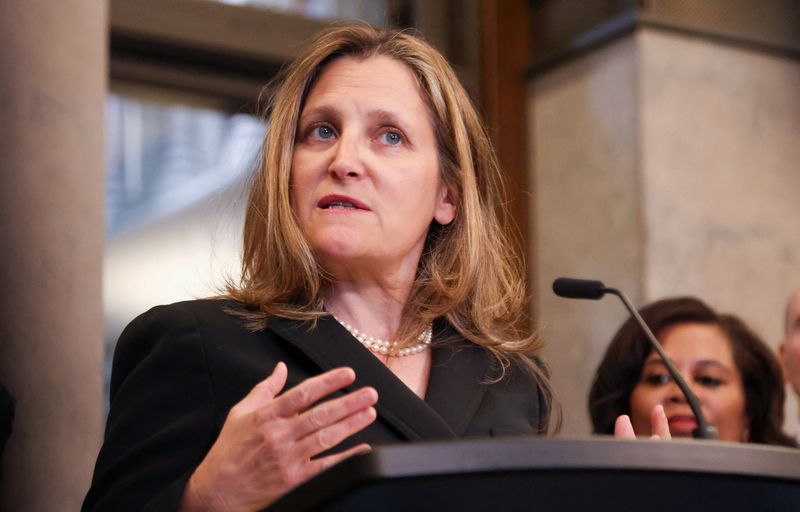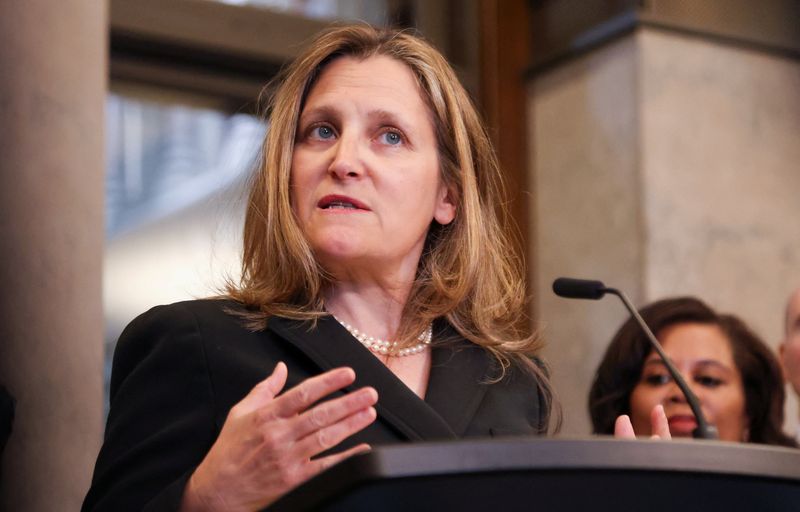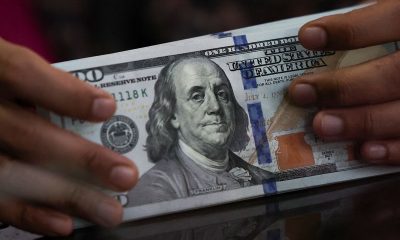Stock Markets
Canada considers imposing import tariffs on Chinese EVs

By David Ljunggren and Ismail Shakil
OTTAWA (Reuters) -Canada is considering whether to impose import tariffs on Chinese-made electric vehicles and will seek the public’s opinion about the idea, Deputy Prime Minister Chrystia Freeland said on Monday.
Freeland said the domestic auto sector faced unfair competition from what she called China’s “state-directed policy of overcapacity,” and that Ottawa would open a 30-day public consultation period on July 2 as to how Canada can respond.
“Chinese producers are quite intentionally generating a global oversupply that undermines EV producers around the world, including here in Canada,” Freeland told reporters in Vaughan, Ontario, echoing concerns raised by the United States and the European Union.
Freeland said public consultations will help the government decide its policy response, which may include tariff on imports, adding that the move would align Ottawa with allies in Washington and Brussels.
U.S. President Joe Biden last month unveiled a bundle of steep tariff increases on an array of Chinese imports, including electric vehicles. The European Commission, which oversees trade policy in the 27-nation, is planning to impose additional duties of up to 38.1% on Chinese producers such as BYD (SZ:), Geely and SAIC, as well as Chinese-built Tesla (NASDAQ:) and BMW (ETR:) cars.
China has rejected accusations of unfair subsidies or that it has an overcapacity problem, saying the development of its EV industry has been the result of advantages in technology, market and industry supply chains.
An opinion piece published in the Chinese state-backed Global Times newspaper ahead of Freeland’s announcement on Monday advocated for “Canada to remain strategically rational” and not “sacrifice normal economic exchanges with China for the sake of Washington’s strategic selfishness.”
Canadian tariffs on Chinese EVs “may undermine market confidence among Chinese investors, worsen bilateral relations and hinder normal economic and trade cooperation,” a Global Times reporter said in the opinion piece.
Prime Minister Justin Trudeau’s Liberal government, which has been trying to position Canada as a critical part of the global EV supply chain, had come under pressure domestically to act against Chinese EVs.
The premier of Ontario, Canada’s most populous province and the main auto-making center, last week urged Ottawa to impose tariffs of at least 100% on Chinese-made electric vehicles to protect jobs.
Freeland declined to get into the specifics of what Ottawa’s potential action would be or if EV components like batteries could also be targeted, but said everything was on the table.

“We’re not ruling anything out,” she said, adding “that we are bringing to bear our strongest trade action tools.”
Canada has inked deals worth billions of dollars to woo companies involved in all parts of the EV supply chain to bolster its manufacturing heartland in Ontario.
Stock Markets
Suburban Propane director Logan sells $139k in shares
Stock Markets
Stock market today: S&P 500 closes lower, but posts big weekly win
Stock Markets
TD Bank promotes Laura Nitti to retail market president role

 Forex3 years ago
Forex3 years agoForex Today: the dollar is gaining strength amid gloomy sentiment at the start of the Fed’s week

 Forex3 years ago
Forex3 years agoUnbiased review of Pocket Option broker

 Forex3 years ago
Forex3 years agoDollar to pound sterling exchange rate today: Pound plummeted to its lowest since 1985

 Forex3 years ago
Forex3 years agoHow is the Australian dollar doing today?

 Cryptocurrency3 years ago
Cryptocurrency3 years agoWhat happened in the crypto market – current events today

 World3 years ago
World3 years agoWhy are modern video games an art form?

 Commodities3 years ago
Commodities3 years agoCopper continues to fall in price on expectations of lower demand in China

 Economy3 years ago
Economy3 years agoCrude oil tankers double in price due to EU anti-Russian sanctions























